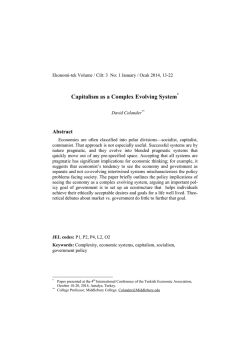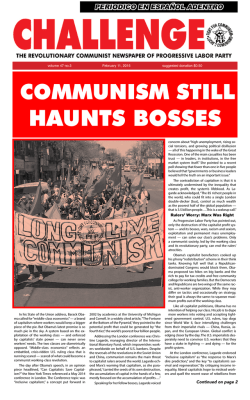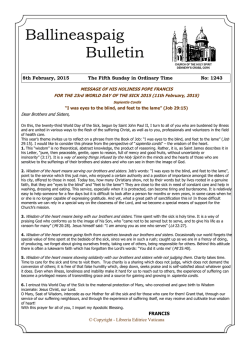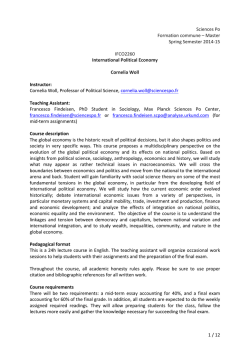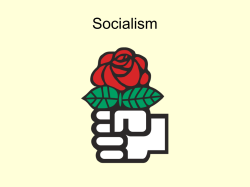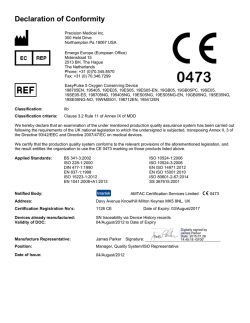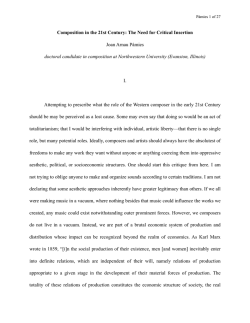
Investment Outlook Gross (PDF)
Investment Outlook from Bill Gross February 2015 Games People Play My mother taught me how to play Monopoly – the game – and the markets over 40 years past have taught me how to play Monopoly – the financial economy. Financial markets and our finance-based economy are actually quite similar to the game in terms of the rules and strategies it takes to win. Monopoly’s real-time bank (the Fed) distributes money to players at the beginning and then continues to create more and more credit as the economy passes go. The cash in Monopoly isn’t credit and the player can’t borrow, so in this respect the game and the reality are quite different, but the addition of cash liquifies the player in a similar way that the Fed creates money out of thin air to liquify today’s finance-based system and create growth in the real economy. Good players know that it is critical to move quickly around the board, make acquisitions and then develop the properties by creating hotels. Three hotels on each property are desirable and of course as every Monopoly pro knows, it’s not Boardwalk or Park Place that are the key holdings but the Oranges and the Reds. Same thing in reality’s markets, I would suggest. Which companies and which investments to overweight and how much leverage to use usually point to the eventual winners. But an ample amount of cash is important as well as you land on other owners’ properties. You need liquidity to pay rent or service debt – otherwise you sell assets at a discounted price and are swiftly out of the game. That reminds me of Lehman Brothers and its aftermath. Early in Monopoly, property is king but later in the game, cash becomes king and those without cash and the ability to get it go bankrupt. It appears however, that since 2008 the rules of the finance-based economy have been substantially changed. Perhaps Parker Brothers will have to come with a new version of its own which incorporates the modern day methodology of central banks using Quantitative Easing and the outright purchase and occasional guarantee of private securities and public stocks to keep the game going. It’s as if Monopoly’s bank, which has a limited amount of 1, 5, 10 … dollar bills in each game box had “virtually” added trillions of dollars more in order to keep players solvent, in the hopes that some of it would trickle out to the real economy. With interest rates near zero and banks and other financial intermediaries sitting on trillions of Dollars, Euros, and Yen, why wouldn’t they lend it out to the private economy in hopes that they could obtain a higher return on their money? Sounds commonsensical, doesn’t it? Not in reality. ... even with the U.S. growing at an acceptable rate for now, its recovery over the past 5 years has been anemic compared to historic norms, and other developed economies are faring much worse. Well to be fair, in some cases and some countries they have. Bank loans in the U.S., for instance, are currently growing at 8% year over year and our economy appears to be growing at a 3% real and nominal growth rate with inflation at 0%. Still, even with the U.S. growing at an acceptable rate for now, its recovery over the past 5 years has been anemic compared to historic norms, and other developed economies are faring much worse. Many appear to be facing new recessions even with interest rates at 0% or – incredibly – negative rates. German and Swiss 5 year yields cost the lender money. Surreal to say the least. Before 2008, economists and historians would not have believed such a condition could exist, but here it is with individual sovereign countries and their respective central banks pushing each other out of the way in a race to the bottom of interest rates – wherever that is – and a race to the bottom in terms of currency valuations. Central bankers claim that they are doing no such thing, but that bravado should be dismissed out of hand. You can’t accuse them of lying but you can accuse them of distorting reality. If all of them collectively could be labeled “Parker Brothers,” like the creator of the board game, players would be justified in saying that competitive devaluations and the purchase of bonds at near zero interest rates is indeed a significant distortion of the markets and – more importantly – capitalism’s rules which have been the foundation of growth for centuries, long before Parker Brothers central bankers came into existence in the early part of the 20th century. Even as the financial system morphed from the gold standard, to the Bretton Woods Dollar standard in 1944, and then the abandonment of any standard in 1971, capitalism seemed to be on firm ground. Incentives to lend, borrow, and invest for a profit were never challenged on a secular basis prior to 2008, except in Japan. There may have been recessions where such an appeal was eliminated at the margin, but no – capitalism was king. It was, as Francis Fukuyama proclaimed, “The End of History” – game, set, match – as Communism and other similar economic systems headed for the trash bin. But the distortions created by post 2008 Parker Brothers have called Fukuyama’s forecast into question. There can be no doubt that negative or even zero percent interest rates cannot be a permanent rule on Monopoly’s new board. Investors and game players do not logically give money away; a mattress ultimately becomes a more attractive haven. And most importantly – because the markets and the financial sector are ultimately the servants of the real economy – growth is challenged and stunted. Investment Outlook | February 2015 2 In a new world, returns on real investment – ROI’s and ROE’s – become so low that the risk of a new project or the purchase of green hotels offer too little return for too much risk. Like the endgame in Monopoly where cash becomes king at the game’s conclusion, cash accumulates in corporate coffers or is used to repurchase stock in the financial economy. Investment in plant and equipment is deferred. Structural headwinds such as aging demographics and abnormally high debt/GDP ratios do not offer the player a “get out of jail free” card, in fact they help keep the cell door closed. Hope is challenged. In the final analysis, while there is no better system than capitalism, it is incumbent upon it and its policymakers to promote a future condition which offers hope as opposed to despair. Capitalism depends on hope – rational hope that an investor gets his or her money back with an attractive return. Without it, capitalism morphs and breaks down at the margin. The global economy in January of 2015 is at just that point with its zero percent interest rates. Officials at the Federal Reserve – the most powerful and strongest of Parker Brothers – seem to now appreciate the hole that they have dug by allowing interest rates to go too low for too long. Despite reasonable growth, some of them recognize the system’s distortion if only because inflation is going down, not up, in the process. Other Parker Brothers countries face deflation in the midst of negative interest rates. But the Fed, uniquely in my opinion, will move up the Monopoly board’s interest rates in late 2015, hoping to avoid landing on the figurative Park Place and Boardwalk in the process. It won’t however, move quickly – capitalism has been damaged by the change in rules since 2008. Caution, therefore will prevail in the U.S. and elsewhere for a long time. Bonds despite their ridiculous yields will not easily be threatened with a new bear market. Investors should expect as well, that because of the slow unwinding of zero percent rates in the U.S., that U.S. and global stocks will be supported. Their heyday is over however. In effect, equity holders now own the Greens, the Blues and the railroads on Monopoly’s board while the Reds and the Oranges belong to another era. Returns in the real economy are too low partially because of the misguided efforts of Parker Brothers bankers. There is no doubt that structural secular stagnation factors such as demographics, high debt, and technology have contributed significantly as well. Fiscal policy has been anemic since 2010. Capitalism’s distortion, with its near-term deflation, poses a small but not insignificant risk to what my mother warned was the final destination for all games – entertainment or real. In the final analysis, an investor – a player – must be cognizant of future low and in some cases negative total returns in 2015 and beyond. Capitalism’s distortion, with its near term deflation, poses a small but not insignificant risk to what my mother warned was the final destination for all games – entertainment or real. “In the end,” she said, “all of the tokens, all of the hotels, all of the properties – they all go back in the box.” The strong odds are that 2015’s distorted capitalism continues with anemic growth, but the box rests on the family room coffee table, waiting, waiting, for its turn. -William H. Gross Investment Outlook | February 2015 3 About Janus Fixed Income Janus has been helping fixed income investors reach their financial goals for more than 25 years. Our team of investment experts is committed to delivering the stability our clients expect, with an unwavering focus on risk-adjusted returns and capital preservation. Today, we serve investors across a variety of markets by offering a diverse suite of fixed income strategies with highly complementary and distinctly separate investment approaches: a bottom-up, fundamental process led by CIO Gibson Smith, and a top-down, global macro process managed by Bill Gross. Follow Bill Gross on Twitter for his latest global macro insights: Twitter.com/JanusCapital Investing involves risk, including the possible loss of principal and fluctuation of value. Returns quoted are past performance and do not guarantee future results; current performance may be lower or higher. The views expressed are those of the author, Bill Gross, and do not necessarily reflect the views of Janus. They are subject to change, and no forecasts can be guaranteed. The comments may not be relied upon as recommendations, investment advice or an indication of trading intent. There is no assurance that the investment process will consistently lead to successful investing. In preparing this document, Janus has relied upon and assumed, without independent verification, the accuracy and completeness of all information available from public sources. Fixed income securities are subject to interest rate, inflation, credit and default risk. The bond market is volatile. As interest rates rise, bond prices usually fall, and vice versa. The return of principal is not guaranteed, and prices may decline if an issuer fails to make timely payments or its credit strength weakens. Investing in derivatives entails specific risks relating to liquidity, leverage and credit and may reduce returns and/or increase volatility. Statements in this piece that reflect projections or expectations of future financial or economic performance of the markets in general are forward-looking statements. Actual results or events may differ materially from those projected, estimated, assumed or anticipated in any such forward-looking statements. Important factors that could result in such differences, in addition to the other factors noted with such forward-looking statements, include general economic conditions such as inflation, recession and interest rates. Janus makes no representation as to whether any illustration/example mentioned in this document is now or was ever held in any Janus portfolio. Illustrations are only for the limited purpose of analyzing general market or economic conditions and demonstrating the Janus research process. References to specific securities should not be construed as recommendations to buy or sell a security, or as an indication of holdings. This material may not be reproduced in whole or in part in any form, or referred to in any other publication, without express written permission. Send email requests to [email protected]. Janus is a registered trademark of Janus International Holding LLC. © Janus International Holding LLC. Janus Distributors LLC FOR MORE INFORMATION CONTACT JANUS 151 Detroit Street, Denver, CO 80206 I 800.668.0434 I www.janus.com C-0115-83238 03-15-16 188-15-29956 01-15
© Copyright 2026

